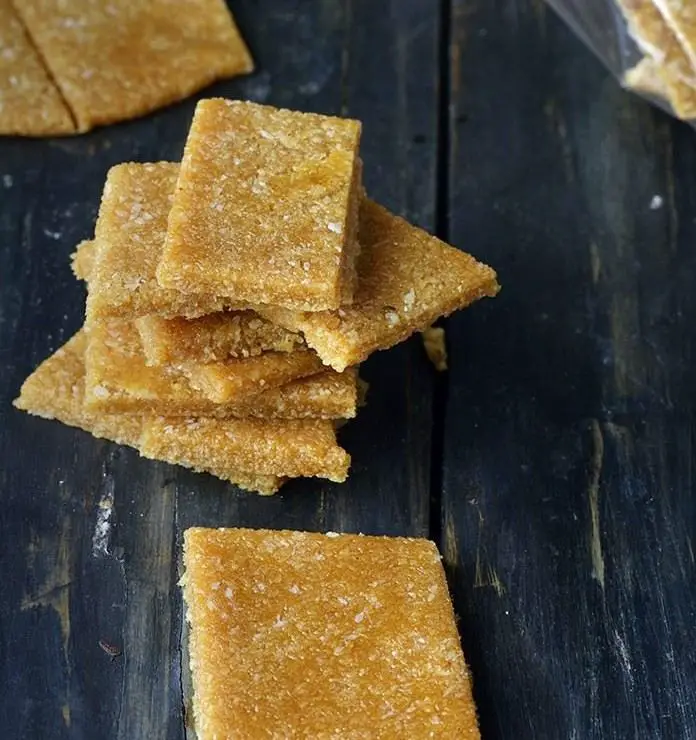Jaggery is an unrefined sugar substance, found in Asia and Africa.
It is frequently referred to as “non-centrifugal sugar” since it is not spun to remove the nutritious molasses during processing.
Similar non-centrifugal sugar products are available in Asia, Latin America, and the Caribbean, albeit under other names.
These items include:
- Gur in India.
- Panela in Colombia.
- Piloncillo in Mexico.
- Tapa dulce in Costa Rica.
- Namtan tanode in Thailand.
- Gula Melaka in Malaysia.
- Kokuto in Japan.
Approximately 70% of the world’s jaggery is produced in India, where it is commonly known as “gur.”
It is often manufactured from sugar cane. However, jaggery derived from date palms is also prevalent in a number of nations.
Contents
Nutritional Information
The molasses content of jaggery makes it more nutritious than pure sugar.
Molasses is a nutritious byproduct of sugar production that is typically eliminated when refined sugar is produced.
The addition of molasses increases the finished product’s micronutrient content by a little amount.
The specific nutritional composition of this sweetener can vary depending on the plant utilized to produce it (cane or palm).

According to a renowned journal, 100 grams of jaggery may contain:
- Calories: 383.
- Sucrose: 65–85 grammes.
- 10–15 grams of fructose and glucose
- Protein: 0.4 grams.
- Fat: 0.1 grams.
- 11 mg of iron, or 61% of the RDI
- Magnesium: 70-90 mg, approximately 20% of the RDI.
- 1050 mg of potassium, or 30% of the RDI.
- 0.2–0.5 mg of manganese, or 10–20% of the RDI.
Keep in mind that this is a 100-gram (3.5-ounce) serving, which is significantly more than you would typically consume at once. You would most likely consume a tablespoon (20 grams) or a teaspoon (7 grams).
Additionally, jaggery may include trace levels of B vitamins and minerals, such as calcium, zinc, phosphorus, and copper.
SugaVida, a commercially available granulated palm jaggery, is believed to be an excellent source of naturally occurring B vitamins.
Unlike sugar, which provides temporary energy, jaggery delivers sustained energy that lasts longer.
This is due to the fact that it is unprocessed, ensuring that blood sugar levels are not quickly altered and instead rise slowly. In turn, this can also assist in avoiding weariness.
Uses Of Jaggery
Like sugar, jaggery is versatile. It can be grated or crushed and used in place of refined sugar in any meal or beverage.
It is frequently used with coconuts, peanuts, and condensed milk in India to create traditional sweets and desserts.
These include jaggery cake and Sakkara Pongal, a rice-and-milk-based treat.
It is also used to produce traditional alcoholic beverages, such as palm wine, as well as for non-food applications, such as fabric dyeing. This sweetener is frequently used as a sugar substitute in Western baking.
Is It Fattening?
The sugar jaggery is composed of long chains of sucrose. The body requires time to digest sucrose, resulting in a gradual and prolonged release of the absorbed energy. Additionally, this makes us feel fuller for longer, lowering our hunger.
Jaggery is an excellent source of potassium, which aids in electrolyte balance, metabolic enhancement, and muscle development.

Additionally, potassium can assist in reducing water retention in the body, hence playing a significant part in weight loss. However, excessive eating might lead to weight gain due to its high composition of glucose, fructose, fat, and protein.
Potential Health Advantages?
The assumption that jaggery is more nutrient-dense than refined white sugar is a factor in its growing popularity. Additionally, it is said to provide numerous health benefits.
The following are some health benefits gained by consuming jaggery.
Relieves Menstrual Pain
Menstrual cramps can be alleviated with jaggery as a natural treatment. Consumption of jaggery causes the release of endorphins, a happy hormone that combats PMS symptoms such as mood swings, irritability, and food cravings.
Additionally, frequent ingestion of jaggery may help regulate irregular menstrual cycles.
Enhancement of Digestive Health
In India, it is common to consume jaggery after a meal.
According to a nutritionist, it aids digestion and stimulates bowel movements, making it an excellent choice for preventing constipation.
Jaggery is a source of sucrose, but it is nearly devoid of fiber and water, two dietary components known to promote regular bowel movements.
No available research supports this assertion. Given its nutritional composition, it is doubtful that jaggery would aid digestion or avoid constipation.
Detoxification Of Liver
Many foods are said to aid the liver in eliminating toxins. Nevertheless, your body is able to eliminate these toxins on its own.

No existing research supports the assumption that any meal or drink can facilitate or enhance this “detox” process.
Enhanced Immune System
In India, jaggery is frequently used in tonics intended to treat a wide range of diseases.
People believe that the minerals and antioxidants in jaggery can strengthen the immune system and aid in recovery from illnesses such as the common cold and influenza.
There is evidence that zinc and vitamin C supplements taken orally may lower the duration and intensity of a cold, but neither is present in significant concentrations in jaggery.
Overall, there is insufficient evidence to support this claim. However, jaggery’s high caloric content may assist in improving energy levels in unwell individuals who have difficulty eating.
Anemia Prevention
Some studies indicate that the body utilizes iron in non-centrifugal sugars more efficiently than iron from other plant sources.
There is around 11 mg of iron per 100 grams of jaggery, or approximately 61% of the RDI.
This may sound great, but eating 100 grams of jaggery in one sitting is highly rare. A tablespoon or teaspoon is a more accurate measure of quantity.
A tablespoon (20 grams) contains approximately 12% of the RDA for iron or 2.2 mg. A teaspoon (7 grams) provides 0.77 milligrams of iron, which is approximately 4% of the RDI.
For individuals with low iron consumption, jaggery could provide a tiny amount of iron, particularly when used in place of white sugar.
Additionally, added sugar is detrimental to health. Therefore, it is unrealistic to recommend adding jaggery to your diet due to its iron content.
Conclusion
Yes, jaggery can cause you to gain weight. It is slightly superior to sugar because it contains additional nutrients, although it is quite caloric. If you wish to lose weight, you must limit the amount of jaggery that you consume.
Overconsumption of jaggery can cause a variety of allergic reactions, including stomachaches, colds, coughs, nausea, headaches, and vomiting, among others. When jaggery is made in unsanitary conditions and contains impurities, it can cause intestinal illnesses.
